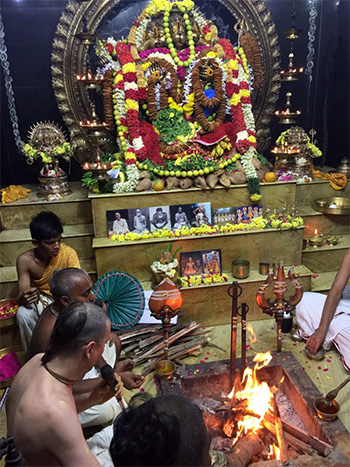Question: I have heard that Lord Rama worshipped Durga Devi. Is this true?
This story is based on the Ramayana, but does not actually come in the Ramayana text of Valmiki. It is found in various Puranas. When Rama was going to cross the ocean, some texts describe that He performed worship of Durga Devi to inform her of His intentions of invading Lanka. The reason for this is that Durga was the protector of Kuvera’s island of Lanka before it was taken by Ravana. As such, it was proper etiquette for Rama, acting as a human king, to inform Durga Devi that He was about to invade her area of control. In this story, Rama acts as a yajaman, and Brahma acts as a priest who performs the sacrifice to please Durga Devi.
In the sattvika puranas, the story is described that Rama prays to Durga, and Durga replies, “I am your external shadow energy. What ever you wish to do, I am your servant.” This is along the lines of the text “shrishti-sthiti-pralaya-sadhana-shaktir eka chayeva yasya bhuvanani bibharti durga” found in the scriptures. Durga Devi (Maha Maya) is the shadow energy of Lord Narayana.
In the rajasika puranas the story is described differently. When Rama calls to Durga, she refuses to appear. Then Rama pierces his eye with an arrow, and Durga Devi appears crying tears of blood.
Throughout the Puranas and various versions of the Ramayana we find a variation of three types of puja Rama did, either to Shiva, Durga or Brahma. It is likely that the variations are due to yuga-bheda, or the minor differences that occur in different ages. The Rama-lila is performed every Treta-yuga, and as such it has occured thousands of times with many variations. We do not know from which time period the stories are recorded in each book. Thus there are many seemingly contradictory descriptions in the Puranas. It is described that Jambavan, the vanara devotee of Lord Rama, takes part in each and every incarnation of Rama in the same body. The cosmic cycles of time are moving like seasons, and these histories are played out in every age on schedule.
Receive our daily email newsletter on Hinduism, Yoga, Meditation, Ayurveda and Natural Healing.






